If you thought the market would rally once a trade deal was struck between the U.S. and China, think again.
According to Shawn Matthews, founder of macro fund Hondius Capital Management, a trade deal between the two countries would end the rally in risk assets that’s been going since late December.
“Right now, it’s a risk-on mentality – you want to be long riskier assets until you get a deal with China,” Matthews said to Bloomberg on Tuesday. “When that happens you certainly want to be looking to scale back.”
Matthews, who was the head of Cantor Fitzgerald’s broker-dealer unit from 2009 until last year and who now runs his own hedge fund, recommends staying invested in equities for now but that when a China deal occurs, “people will then look at the positions in their portfolios and reassess their risks,” a set-up that will lead to more selling than buying in a classic case of “buy the rumor, sell the fact.”
Markets have been surging since late December as optimism builds around a trade deal being reached and a wait-and-see stance from the Fed regarding further rate increases, the latter of which was confirmed last week. Since Christmas Eve, when the S&P 500 slid briefly into bear market territory, both the S&P 500 and the Dow are up more than 16%, and the Nasdaq is up 19%.

However, “The bond market is not seeing the follow through,” Matthews said. “If it was truly a risk-on world and people believed it and it was an extended trade, then you would see the 10-year start to back up. That’s a clear sign there’s some concern about what’s going on out there.”
Matthews speculates that a trade deal may be struck just ahead of the March 1 deadline, which is when U.S. tariffs on $200 billion of Chinese imports rise to 25%, but the magnitude of the market’s reaction will depend on the details of whatever agreement is reached. U.S. Trade Representative Robert Lighthizer and Treasury Secretary Steven Mnuchin are heading to Beijing for the trade talks next week, which could pave the way for a meeting between the presidents of the two countries near the March 1 deadline.
“You want to fade the rally into the deal – and that deal is probably going to be a watered down deal anyway,” Matthews said. He doesn’t see stocks heading much higher than where they are now as investors wrestle with slowing growth globally and the potential that interest rates could climb further this year, even as the Fed’s policy seems to be on hold for the time being.